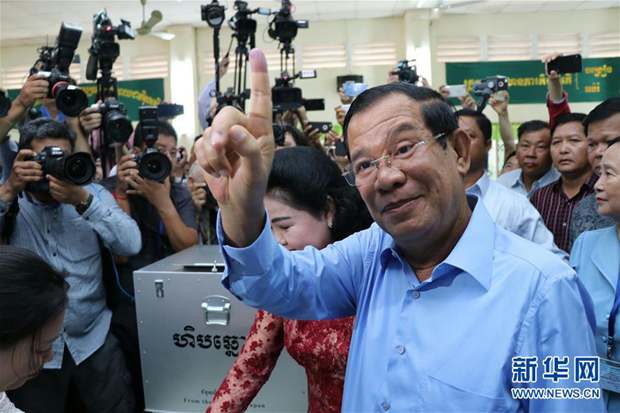International community needs patience with Cambodia
- By Niranjan Sahoo
 0 Comment(s)
0 Comment(s) Print
Print E-mail China.org.cn, August 7, 2018
E-mail China.org.cn, August 7, 2018

General elections were held in Cambodia on July 29, 2018 to elect members of the sixth National Assembly As widely speculated for months, Prime Minister Hun Sen's Cambodian People's Party (CPP) swept the election for the National Assembly for sixth time in a row.
This is largely because the main political opposition Cambodia National Rescue Party (CNRP) had boycotted the election amid a government crackdown on its main leader Kem Sokha. Recalling back to the 2013 election, Hun Sen's party captured power with just a 4 percent vote share lead over its main rival CNRP. The other 19 parties that participated in the election are smaller and obscure parties in which several of them were seen as proxies for the ruling party.
The electoral outcome which allows Hun Sen to lengthen his 33-year-long hold over the impoverished and deeply divided nation has attracted widespread global condemnation from countries such as the United States and European Union. International observers including Human Rights Watch have called the elections "fundamentally flawed" and a "meaningless exercise" as the main opposition has been denied a chance to effectively participate.
Sochua Ma, vice president (in exile) of CNPR called on the international community to call out the "sham election," which he labeled an "electoral circus" and the "death of democracy in Cambodia." As expected, condemnation and criticism has poured over the outcome of the election in Cambodia.
Nonetheless, the outcome of the sixth general election is viewed as a significant step by many analysts who consider it to further strengthen the post-Khmer Rouge peace efforts as well as likely to accelerate Cambodia's already high economic growth. The World Bank has projected a 6.9 percent growth for 2018 and it expects the impoverished nation to flourish in the sectors of agriculture, tourism, textiles and apparel exports. High growth is required to lift the 16 million strong population out of poverty.
And the key architect of this turnaround is none other than controversial Hun Sen, a former Khmer Rouge commander who defected from Pol Pot's murderous regime to join the Vietnamese backed government in 1979 to become the country's prime minister in 1985. However, his party lost the first post-war election to royalists in 1993, forcing him to share power with Prince Norodom Ranariddh. In 1997, Hun Sen engineered a coup to unseat Ranariddh and become the full-fledged prime minister of the conflict-ravaged country. Since then, he has won all the elections (1998, 2003, 2008, 2013 and 2018) making him the longest serving prime minister in the whole of Southeast Asia.
The country's postwar reconstruction activities fueled largely by international donations and aid and rising economic growth have helped Hun Sen to maintain his popularity especially among the rural population.
Yet his high-handed behavior, especially the crackdown on the leaders of the other main political parties as well as restrictions on the free press and civil society organizations is increasingly making him a global pariah. The shutdown of the influential The Cambodia Daily was the most glaring act recently. Thus, while Cambodia's GDP has increased manifold in recent decades, the country's human rights record has taken a steep nosedive.
The immediate fallout of the highly controversial election is possible economic sanctions from the U.S. and European Union. While China has been playing a lead role in fueling the country's recent growth, Cambodia has deep economic ties with the Western countries, particularly the U.S. and the EU.
For instance, out of $18.6 billion worth of foreign exports in 2016, the U.S. alone received 18 percent of them ($3.20 billion). It also exported $5.26 billion to EU in 2016. Thus, the country stands at a critical crossroad. A deeply fractured conflict-ridden country with a large impoverished population, Cambodia can hardly withstand serious economic sanctions as being currently debated in western capitals.
At the moment, Cambodia and its leadership, despite being autocratic and highhanded, needs to be engaged with and persuaded. The international community would do well not to resort to "failed" economic sanctions which often produce bizarre and highly undesirable consequences. Finally, democracy and good governance take time and prolonged nourishment.
Niranjan Sahoo is Senior Fellow, Observer Research Foundation, New Delhi.
Opinion articles reflect the views of their authors, not necessarily those of China.org.cn.





